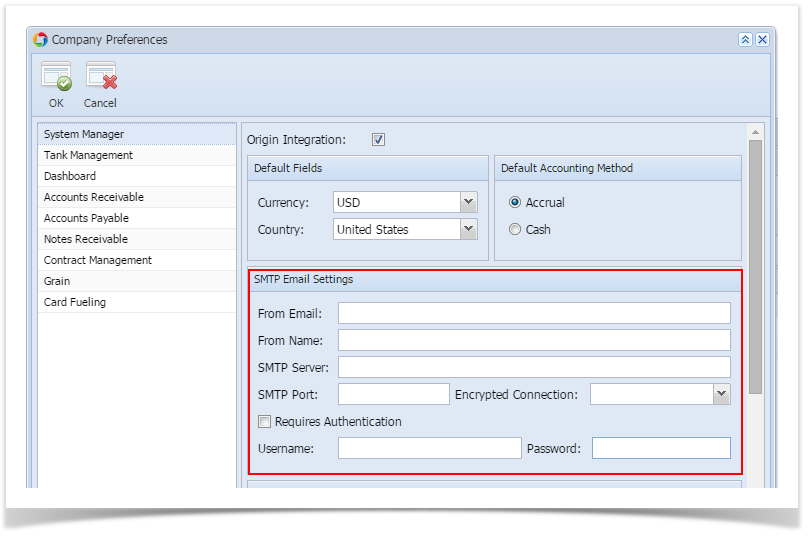| Description | How To | |
|---|---|---|
1. Create a Customer | Go to Sales > Customers | |
If the search grid is displayed, click New button to open a new Entity screen.
| ||
Provide the required customer details:
Fill out the Email field. Fill out other fields on Entity tab and Customer tab, if necessary. Save the customer record. | ||
| 2. Add a customer Location | Go to Sales > Customers.
| |
| Click Insert button. | ||
Provide the required details - Location Name and Terms. Fill out other fields if necessary. Save and close the Entity Location record. | ||
| 3. Add a customer Contact | Go to Sales > Customers.
| |
| Click the Insert button. | ||
Provide the required details - Full Name. If the Portal Access is checked, Email (username) will become a required detail. Check the Portal Access check box Provide the Email (username). Fill out other fields if necessary. Save the changes. Click the Change Password button and enter the new contact password. Save the changes. Click the Email Login button to send the login credential to the contact's email add.
| ||
Go to Portal Permissions tab. Check the menus that will be accessible to the contact.
Save and close the Entity Contact screen. | ||
Open the i21 login page on another tab. Use the customer contact's credential to log on to i21.
| ||
| 4. Create a Quote | Go to Sales > Quotes | |
| If the search grid is displayed, click New button to open a new Quote screen. | ||
Provide the required details on header area - Customer, Location, Bill To, Ship To, Terms. Fill out other header fields if necessary. | ||
Add an item in the grid area. Provide the following details - UOM, Ordered, Price. Fill out other grid fields if necessary. | ||
Set the Quote Status to Won. Click the Process button to process this Quote to Sales Order. Close the Sales Order screen. | ||
| 5. Create a Sales Order | Go to Sales > Sales Orders | |
| If the search grid is displayed, click New button to open a new Sales Order screen. | ||
Provide the required details on header area - Customer, Location, Bill To, Ship To, Terms, BOL No, Freight Terms, UOM. Fill out other header fields if necessary. | ||
Add an item in the grid area. Provide the following details - UOM, Ordered, Price. Fill out other grid details if necessary. | ||
Click the Process button to process this Sales Order to Inventory Shipment.
| ||
| 6. Create an Invoice | Go to Sales > Invoices | |
| If the search grid is displayed, click New button to open a new Invoice screen. | ||
Select a Customer. (If the Add Inventory Shipment screen is displayed, close it) Provide the required details on header area - Customer, Location, Bill To, Ship To, Terms, Freight Terms. Fill out other header fields if necessary. | ||
Add an item in the grid area. Provide the following details - UOM, Ordered, Price. Fill out other grid details if necessary. | ||
Save the record. Click Post button. | ||
| Click the Print button to view the preview of the Invoice report. | ||
Click the Email > Email Template - this will open the Email Template screen. Provide the Email Template details.
| ||
Back to Invoice, click the Email > Email Invoice button. This will send the Invoice to the customer's primary contact. Close the Invoice screen. | ||
| 7. Create a Credit Memo | Go to Sales > Credit Memos | |
| If the search grid is displayed, click New button to open a new Credit Memo screen. | ||
Provide the required details on header area - Customer, Customer, Location, Bill To, Ship To, Terms. Fill out other header fields if necessary. | ||
Add an item in the grid area. Provide the following details - UOM, Ordered, Price. Fill out other grid details if necessary. | ||
Save the record. Click Post button. | ||
Close the Invoice screen. | ||
| 8. Pay the Invoice | Via Receive Payment | Go to Sales > Receive Payments |
Select the Deposit Account. Use the Location and Currency to filter the records in the grid. In the grid area, look for the the Invoice you want to pay.
Click Post button. Close the Receive Payments Posting Details screen.Close the Receive Payments screen. | ||
| Via Receive Payment Details | Go to Sales > Receive Payment Details | |
| Select a Customer. | ||
Provide the required details - Location, Deposit Account, Payment Method. | ||
In the grid area, look for the Invoice you want to pay.
| ||
| Double click the Amount Paid field. | ||
| Save the record. | ||
| Click Post button. | ||
Overview
Content Tools
